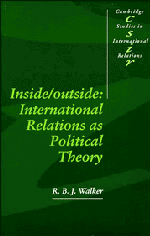Book contents
- Frontmatter
- Contents
- Preface
- 1 International relations as political theory
- 2 The Prince and ‘the pauper’
- 3 Ethics, modernity, community
- 4 History, structure, reification
- 5 Realism and change
- 6 The territorial state and the theme of Gulliver
- 7 On the spatio-temporal conditions of democratic practice
- 8 Sovereign identities and the politics of forgetting
- Notes
- Bibliography
- Index
2 - The Prince and ‘the pauper’
Published online by Cambridge University Press: 05 July 2011
- Frontmatter
- Contents
- Preface
- 1 International relations as political theory
- 2 The Prince and ‘the pauper’
- 3 Ethics, modernity, community
- 4 History, structure, reification
- 5 Realism and change
- 6 The territorial state and the theme of Gulliver
- 7 On the spatio-temporal conditions of democratic practice
- 8 Sovereign identities and the politics of forgetting
- Notes
- Bibliography
- Index
Summary
The politics of origins
In canvassing the problems and achievements of contemporary theories of international relations, Kal Holsti has succinctly repeated a familiar refrain. ‘International theory’, he says, ‘is in a state of disarray.’
In the past decade, the three-centuries long intellectual consensus which organised philosophical speculation, guided empirical research, and provided at least hypothetical answers to the critical questions about international politics has broken down. New conceptions and images of the world, and how it works in the diplomatic, military, and commercial domains, have arisen. Scholars have offered trenchant criticisms of the ‘realist’ tradition, which goes back to Hobbes and Rousseau, severely challenging the assumptions and world views upon which it is based. Some have outlined alternatives, not so much because they promise better understanding through methodological innovation, but because they are supposedly more consistent with contemporary realities. The continued underdevelopment of many new states, combined with the startling pace of technological transformation, have raised new kinds of questions about international politics, questions which were not relevant to the kinds of problems contemplated by our intellectual ancestors and most of those working within the realist, or classical tradition.
In this passage, Holsti stresses three themes that have been common to many attempts since at least the mid-1970s to take stock of how we ought to examine the ‘realities’ of international relations.
- Type
- Chapter
- Information
- Inside/OutsideInternational Relations as Political Theory, pp. 26 - 49Publisher: Cambridge University PressPrint publication year: 1992

